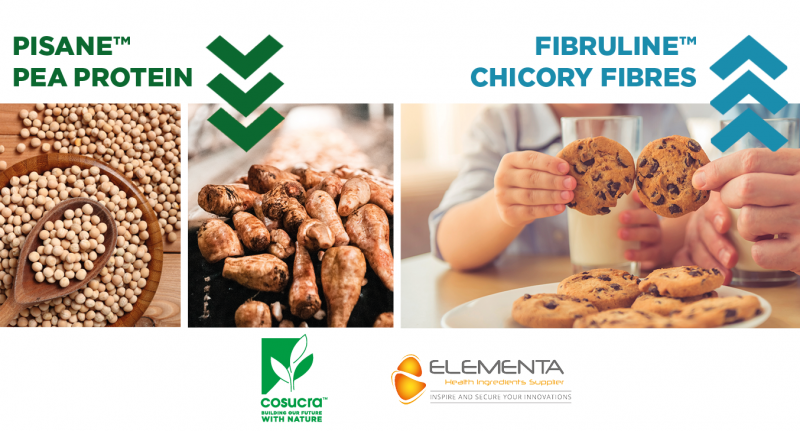
Our range of nutri-functional ingredients is growing
Excited to bring you the latest developments in our range of nutritional and functional ingredients; PISANE™ pea protein and FIBRULINE™ chicory root fibre from Cosucra.
Cosucra is an internationally renowned Belgian family business that is dedicated to promoting the transition to a modern, healthy and sustainable diet. It is a major player in plant-based proteins.
Cosucra and Elementa share the ambition and desire to continue improving consumer health. This is achieved by producing innovative plant-based and locally-sourced nutritional ingredients: chicory and peas.
PISANE™: a source of quality plant-based protein
As a nutritional source and for its functionality, PISANE™ protein becomes a key ingredient in our existing range. PISANE™ is a range of pea protein isolates made in Belgium and composed of 83% minimum protein content based on the dry matter.
It has:
- Nutritional benefits: it is a high-quality plant-based protein source with a chemical score of 0.96 and is highly digestible (98%)
- Functional benefits thanks to optimal solubility, good dispersibility and emulsifying properties
- An organoleptic advantage thanks to its neutral flavour
Selecting PISANE™ in its formulations is a way of embracing the logic of a more sustainable diet. The peas are sourced locally (mainly in France), are GMO-free and are grown without the need for nitrogen fertilisers or irrigation, and with limited use of pesticides.
PISANE™ is available under a variety of references with specific functionalities to meet market requirements.
The protein can easily be incorporated into drinks, dairy substitutes (yoghurts, cheeses, desserts, ice creams, etc.), bakery and biscuit products, cereal products, bars, protein mixes and other nutritional or sports applications.
FIBRULINE™: fibre for improved nutritional balance
FIBRULINE™ is a range of soluble dietary fibre derived from chicory roots. It is composed of 90% inulin on a dry matter basis.
This chicory fibre is of natural origin and is sourced locally, and GMO-free, which is also in keeping with sustainable food principles. It is made in Belgium by Cosucra using a gentle extraction process.
Incorporating FIBRULINE™ into your dietary formulations can provide better nutritional balance; enriching with fibre and reducing sugar and fat levels.
As a replacement for fats, its gelling properties enable it to mimic fat and improve mouthfeel. As a substitute for sugar, its slightly sweet taste is a real bonus.
FIBRULINE™ is easy to use as it is highly soluble, colourless and has no impact on flavour. A variety of references are available to best suit your formulation requirements in bakery products, bars and snacks, dairy substitutes, beverages, confectionery, etc.
And, last but not least, FIBRULINE™ is a beneficial ingredient for human health. For one thing, quite simply because it enriches food products with fibre, thereby increasing intake. In France, fibre intakes (20g/day on average for adults) appear to be too low compared with the Anses recommendations (30g/day).
Chicory root fibre has prebiotic properties, meaning that it is neither digested nor absorbed by the small intestine, helping to nourish the intestinal microbiota. According to published scientific studies, chicory inulin has a beneficial effect on intestinal transit, improves mineral absorption, helps control appetite and stimulates the immune system.
Sources
- Cosucra brochure and website, consulted on 16-02-2024.
- INCA 3 study, Anses website, 2017.
- Gorissen, S., &Witard, O. Characterising the muscle anabolic potential of dairy, meat and plant-based protein sources in older adults. Proceedings of the Nutrition Society, 77(1), 20-31.
